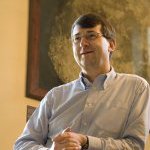Curious Physicists
Curious Physicists
Join Oxford University's Professor Roger Davies (Christ's 1975) as he explains how the 2020 recipients of the Nobel Prize for Physics (which included Oxford mathematician Sir Roger Penrose) showed that black holes were predicted by Einstein’s General Theory of Relativity and how they were able to demonstrate the existence of such a super-massive black hole at the heart of our own galaxy. The first test of General Relativity was made by measuring the deflection of light during the 1919 solar eclipse. During the talk a total solar eclipse will cross Chile and Argentina and participants should be able to watch it via a live stream online, along with the presentation.
This talk is part of the Oxford and Cambridge Universities Alumni Travel programme and is organised by Last Frontiers, our tour operator partner for Latin America.
Schedule
3.45pm - Welcome from Ed Paine, Last Frontiers, Claire Baxter and Kate Suares, Cambridge and Oxford Alumni Offices
3.55pm - Talk from Professor Davies
4.30pm - Q&A with Professor Davies, facilitated by Ed Paine
4.45pm - Finish
Please note, this event will be recorded.
Speaker
Professor Roger Davies (Churchill 1975)

Professor Roger Davies is the Philip Wetton Professor at the University of Oxford. He researches cosmology, and how galaxies form and evolve. He has worked at world-leading observatories, and pioneered a new class of astronomical spectrograph to measure galaxies’ mass and age, and search for black holes in their nuclei.
After reading Physics at University College London, Roger researched at Cambridge, California and Arizona, moving to Oxford in 1988. He was part of the team to discover the ‘Great Attractor’, a concentration of galaxy clusters in the southern sky. Roger is the Founding Director of the Hintze Centre for Astrophysical Surveys.
Booking information
Booking for this event is now closed.
